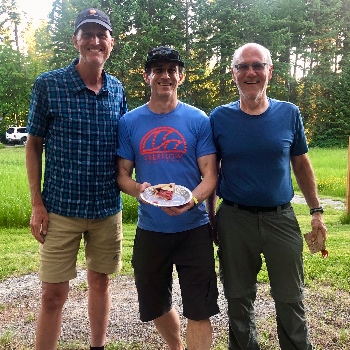
I was walking along the Alpe Adria Trail in 2022, strolling with a friend on the trip through a forested section in Slovenia, and in the course of our conversation, I mentioned ‘family lexicon’. She asked me what I meant by that term. I explained that every family, or at least our family, has a family language; terms that don’t mean anything to other people, or maybe have a different meaning to the family than the general usage. One common source of these words or phrases are the kids of the family, as they are learning to speak, and navigating life.
My friend thought about it as we walked along, and one example, then another, occurred to her. I told her I keep a note on my iPhone so when I think of one, I can write it down. I currently have 35 entries on my Family Lexicon note.
The entries fall into a couple of categories. The largest by far is things the kids said growing up. Each of them comes with a story, which is evoked by the use of the word or phrase. For example: ‘1-2-3 math’, or simply ‘1-2-3 ___’ is shorthand for ‘it’s not complicated’. Our youngest son Grant, when he was in elementary school, came home and asked for help on some math homework. Francie explained that Dad was an engineer and had a lot of math skills, to which Grant said “Mom! It’s 1-2-3 math”, meaning it was simple math, well within her capabilities.
Another example from Grant is “It’s not my fault I have a life.” When he was old enough to push the lawnmower, it was Grant’s job to mow the lawn at our Carlsbad house, which was a tiny patch in the front and one in the back yard. I told Grant I wanted the lawn mowed Saturday morning. He would not get around to it, I would remind him. Next weekend it was Sunday before he got around to it. After a few months, he was exasperated at being pestered. He said “I don’t understand why it’s important that the lawn gets mowed on Saturday morning.” I explained that he didn’t need to understand, I was paying, so I set the success criteria for the job (I wanted it done Saturday morning so that after working an 80-hour week, I could enjoy a nice lawn for the weekend). His rejoinder was “It’s not my fault I have a life”, indicating that he, as a teenager, had way more important things to attend to than mowing the lawn. I ended up having to fire him, which has been the only time in his life that he’s been let go from a job.
Sometimes the lexicon is expanded by a shared life experience. Many decades ago, Francie and I were at our local Auto Club to book a cruise. The very helpful and enthusiastic young woman in their travel section was apparently new at the job, or not especially bright, or both. Every time we asked a question, she would say “That’s a good question; I don’t know but I’ll find out.” She would turn aside, get on the phone (this was pre-internet), have a long conversation, then hang up, turn back to us, and say “Let me tell you what I’ve learned.” This exchange must have happened 6-8 times during our process of booking a cruise. So now, decades later, when Francie and I are together, and one of us looks something up on the computer or the phone, we turn to the other one and say, “let me tell you what I’ve learned.”
Other people’s kids can also be a source of family lexicon. Many years ago, my friend Ryan Jordan and his family was visiting us in Carlsbad. His son Chase must have been 3 or 4 at the time. He was earnestly explaining something or other to me, and said, with the unbridled confidence common at that age, “I am an expert”, with ‘expert’ pronounced with a unique accent also common at that age, emphasis on the second syllable. Now “I am an expèrt” is our term when we want to establish our credentials on a matter.
Even YouTube can be a source for family lexicon terms. One of my all-time favorites is the kid gives a speech after learning to ride his bike. I love his choice of words when asked to describe his emotion; “I feel very happy of myself”. So now, when we’re proud of something we accomplished or figured out, we say “I feel very happy of myself.” I hope one day my friend Brendan Leonard at Semi-Rad will devote one of his Friday Inspirations emails to figuring out where the kid is now, probably a highly-paid motivational speaker.
While a family lexicon is typically mostly shared within the family, sometimes they can become shared language in a larger group. My friend that I was hiking with in Slovenia, upon reflection, shared one from her nephew. He was brought up in an enlightened household, encouraged to express himself without yelling and tantrums. His expression, when made to do something he didn’t want to, was a plaintive “This is not my preference!” We so loved the image of a 3-year old expressing this that we incorporated into our family lexicon, when we’re doing something we know we have to, but don’t really want to.
What are some of the terms from your family lexicon?






this is good stuff!
I hear you Glen, but I’m not writing it down. Roger when he was sick used to say he felt “not very quiet”…and he once misheard “gravitate to the door” as “grab a pig at the door”, which is how we’ve said it ever since…
Oh man, I forgot the “…I’m not writing it down” one, that’s not even on my list. A good one from work, a whole OTHER source of these…